#Bulk Material Storage
Explore tagged Tumblr posts
Text
Every construction project comes with its own unique set of challenges, especially when it comes to material storage and logistics. In areas like Soil Stabilization in Chicago, Illinois, projects that require soil stabilization depend on efficient, adaptable bulk storage solutions to ensure smooth operations. On-site bulk storage not only saves valuable space but also provides immediate access to materials, helping to keep construction timelines on track.
0 notes
Text
Flat Bottom Storage Silos – Reliable Bulk Storage Solutions by Royal Water Project
At Royal Water Project, we specialize in designing and delivering high-capacity Flat Bottom Storage Silos for industrial, commercial, and agricultural applications. These silos are ideal for long-term bulk storage and are widely used for storing grains, food products, and other bulk materials.
🏗️ Precision-Engineered Flat Bottom Silos
Our Flat Bottom Silos are built with precision using high-quality materials to ensure strength, durability, and optimal storage performance. Designed for easy discharge and minimal residue, they are perfect for handling a wide variety of bulk goods, from grains to industrial powders.
🛢️ Industrial Storage Silos in India
As a leading provider of Industrial Storage Silos in India, we cater to various sectors including agriculture, food processing, chemical, and manufacturing industries. Our silos are engineered to withstand extreme weather conditions, ensuring your material remains safe and secure.
🌾 Agricultural & Grain Storage Silos
We offer specialized Agricultural Silos and Grain Storage Silos in India that provide efficient and hygienic storage solutions for farmers and grain traders. These silos help maintain grain quality and reduce post-harvest losses, making them a vital part of modern farming infrastructure.
🛠️ Custom Storage Silos in India
At Royal Water Project, we understand that every storage need is unique. That’s why we offer Custom Storage Silos in India to meet specific size, volume, and design requirements. Whether you need small-scale or large-capacity silos, our team is ready to deliver.
Why Choose Royal Water Project?
Premium-grade Flat Bottom Storage Silos
Robust designs for long-term storage
Suitable for industrial and agricultural use
Custom-built solutions for bulk materials
Nationwide service and installation support
💼 Get the most trusted Bulk Storage Solutions with Royal Water Project – your partner in durable, efficient, and cost-effective silo systems.
📞 Contact us today to know more about our Silos for Bulk Materials and get a tailored solution for your project needs.
#Flat Bottom Storage Silos#Industrial Storage Silos i India#Flat Bottom Silos#Bulk Storage Solutions#Custom Storage Silos in India#Silos for Bulk Materials#Agricultural Silos#Grain storage Silo in India
0 notes
Text
How Bulk Storage Silos Improve Storage Capacity and Efficiency in Industries
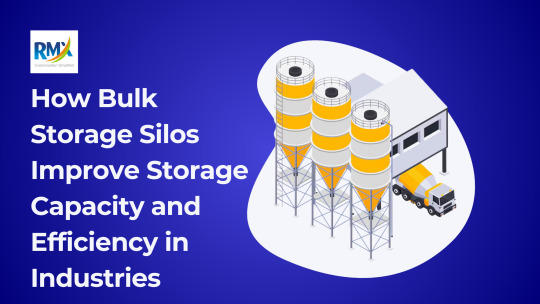
Effective storage solutions are essential for projects involving mass production. Whether in agriculture, manufacturing, or construction, mass storage facilities have changed the way resources are stored, managed, and used. In this blog, we will explore how large silos contribute to increased storage and efficiency, their various applications, and the role of reliable silo manufacturers in tailored solutions in the of them.
The Role of Bulk Storage Silos in Industries
A bulk silo is a vertical or horizontal storage facility specifically designed to store bulk materials in the form of granular, powder, or liquid. These silos ensure efficient use of space, protect inventories from external environmental influences, and facilitate efficient management.
Industries such as agriculture, cement and pharmaceuticals rely on massive storage silos to streamline their operations, resulting in increased productivity and administrative costs
Key Benefits of Bulk Silo Systems:
Maximized Storage Capacity:
Bulk silos offer vertical and horizontal options such as vertical cement silos and horizontal cement silos to maximize space.
Material Preservation:
By protecting products from moisture, pests and contamination, silos improve product quality, especially in areas such as food and manufacturing.
Operational Efficiency:
Advanced features such as the silo feeding system allow for easy loading and unloading, reducing waste and minimizing manual labor.
Types of Bulk Silos for Specific Applications
1. Vertical Cement Silo:
These silos are ideal for storing powdered materials like cement and fly ash. They occupy less ground space and offer excellent material handling features.
2. Horizontal Cement Silo:
Designed for locations with height constraints, these silos are easy to install and transport, making them a preferred choice for temporary construction sites.
3. Readymix Welded Silo:
Used in ready-mix concrete plants, these silos ensure continuous supply and quick blending of cement and other materials.
Choosing the Right Silo Feeding System
The silo feeding system is key to automation and efficiency. These systems are scalable to accommodate a variety of silos, increasing productivity by reducing manual operations and improving consistency.
Maintenance and Longevity of Bulk Silos
Proper maintenance is essential to ensure the longevity and efficiency of bulk silos. Regular inspections for corrosion, wear and tear, and timely cleaning help preserve their functionality. Many silo manufacturers offer after-sales services and maintenance support to keep silos at a high level.
Applications of Bulk Silos Across Industries
Construction and Cement Industries:
Storage facilities such as cement storage silos, Radimix welded silos and fly ash silos are a must in the construction industry. They ensure uninterrupted delivery, support routines, and reduce downtime.
agriculture:
Designed for grain and other agricultural commodities, the silo ensures safe and efficient storage, reduces post-harvest losses and improves product quality
Chemical and Pharmaceutical Sectors:
For applications requiring precise handling, silo containers and bulk silos are designed for storage and handling of powder, liquid, or granular chemicals
Why Choose Reliable Silo Manufacturers?
Choosing the right silo manufacturer is essential to ensure a high-quality, sustainable and efficient solution. Leading manufacturers like RCMPL offer a wide range of silo options, including multiple storage silos, silo products for different projects, and customized solutions to meet specific needs role.
Features to Look for in Bulk Silos:
Durable building materials that can withstand the environment.
Improved silo feeding system for better efficiency.
Customizable designs for both vertical and horizontal installations.
Conclusion
Bulk Storage Silos are a game-changer for industries that deal with large volumes of materials. By improving storage capacity and operational efficiency, they help businesses cut costs, enhance productivity, and achieve sustainability. Whether you need a Vertical Cement Silo, Horizontal Cement Silo, or a specialized Fly Ash Silo, investing in high-quality bulk silo systems is a smart decision for long-term benefits.
For top-tier silo solutions tailored to your industrial needs, explore the offerings from RCMPL. Their expertise in bulk material storage silos ensures you get the best in design, quality, and functionality.
#Bulk Storage Silos#Bulk Silo Systems#Bulk Material Storage Silos#silo manufacturers#bulk silos#silos material
0 notes
Link
At Total Transload we conduct our business and personal affairs with the highest level of integrity. We take responsibility and liability for all our words and actions.
#Bulk Material Handling in Edmonton#Total Transload Service#Warehousing and Storage in Edmonton#Transload Services#Bulk Material Handling
0 notes
Text
Bulk Storage Silos
Featuring a cylindrical shape and conical bottom, Sodimate Inc. provides bulk storage silos that facilitate complete discharge, preventing product buildup and ensuring seamless operation. From 200 to 7,000 ft³ capacities, we have the perfect storage solution for your needs. Contact us for further queries.

0 notes
Text
Little P.Eng. Engineering: Pioneering Bulk Material Transfer Design across Canada and the USA
When it comes to the intricate world of bulk material transfer, North America's industrial backbone relies heavily on robust, efficient, and innovative machinery. Operating at the forefront of this industry is Little P.Eng. Engineering, a name synonymous with exemplary structural and mechanical design across Canada and the USA.
Bulk Material Transfer Design: The Pulse of Modern Industry
Transcending borders, bulk material transfer is central to the heartbeat of contemporary industries. From the sprawling mines of Canada to the bustling ports of the USA, the movement, deposition, and retrieval of large-scale materials demand a seamless blend of precision, durability, and adaptability.
Journeying Through Little P.Eng. Engineering’s Pan-North American Impact
Single-boom Spreaders:
Functionality: Essential in the processing of minerals, ores, and coal, these machines promise uniformity in layering vast material amounts.
Little P.Eng. Across Continents: Adapting to the varied terrains and industrial needs of Canada and the USA, Little P.Eng.'s designs optimize weight distribution, longevity, and operational flexibility.
Mobile Stacking Bridges:
Functionality: Mobile and versatile, these units aid in the strategic stockpiling of materials in expansive stockyards.
Little P.Eng.’s Transnational Signature: Ensuring a balance between agility and stability, the design innovations address diverse geographic and operational needs across North America.
Transport Crawlers:
Functionality: These titans manage the internal transportation of massive equipment, streamlining logistical challenges.
Little P.Eng.’s North American Adaptability: By designing crawlers that focus on energy efficiency and terrain adaptability, they address the unique challenges of both Canadian mines and American industrial facilities.
Stackers and Reclaimers (Single & Combined):
Functionality: While stackers deposit materials systematically, reclaimers specialize in their retrieval. Combined machinery handles both roles.
Little P.Eng.'s Pan-American Approach: Catering to the varying scales and nuances of industries across the two nations, designs prioritize transition fluidity and spatial optimization.
Bucket Wheel Reclaimer (Boom & Bridge):
Functionality: With an array of buckets, these reclaimers ensure efficient retrieval from vast stockpiles.
Little P.Eng.’s Cross-Border Excellence: Be it the Canadian cold or the American heat, precision-focused designs ensure efficient operations under diverse conditions.
Scraper, Drum, and Portal Reclaimers:
Functionality: Each variant is uniquely designed to retrieve stockpiled materials, adhering to specific operational demands.
Little P.Eng.’s Continental Precision: By crafting machinery tailored for the specific needs of locations from Alberta to Alabama, the emphasis is on tailored efficiency.
Portal and Bridge-type Scraper Reclaimers:
Functionality: These reclaimers excel in longitudinal stockyards, merging efficiency with compactness.
Little P.Eng.’s Broad Vision: The designs seamlessly integrate with North American industrial landscapes, maximizing space and operational potential.
Ship Loaders & Unloaders:
Functionality: Vital cogs in maritime logistics, these entities manage the intricate process of loading and unloading materials.
Little P.Eng.’s Coastal Touch: With an understanding of the varied port dynamics across the two nations, designs ensure faster operations, minimizing ship turnaround times.
Grab Type Ship Unloader:
Functionality: Specializing in rapid unloading, they promise efficiency at its best.
Little P.Eng.’s Harbor Mastery: Emphasizing precision and speed, designs cater to the bustling ports of both Canada and the USA, ensuring peak operational performance.
Circular Storage with Stacker/Bridge Reclaimer:
Functionality: These units epitomize the optimal utilization of circular stockyards, promising swift stacking and retrieval.
Little P.Eng.’s Circular Innovation: By integrating space-saving techniques with high-speed operations, designs redefine the contours of material storage and retrieval.
Beyond Borders: Little P.Eng. Engineering’s Vision
For Little P.Eng. Engineering, the journey isn’t just about creating machinery. It’s about crafting solutions, ones that resonate with the industrial ethos of both Canada and the USA. Recognizing the unique challenges and potentials of each nation, the company's designs embody adaptability, sustainability, and the future.
Conclusion
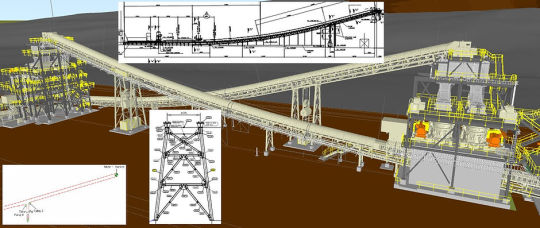
Read more:
Transforming the Landscape of Bulk Material Management through Structural and Mechanical Design
Tags:
Little P.Eng. Engineering
Structural design
Mechanical design
Single-boom spreaders
Mining equipment
Bulk material transfer
North American industries
Mobile stacking bridges
Transport crawlers
Stacker and reclaimers
Bucket wheel reclaimer
Boom & bridge reclaimer
Scraper reclaimers
Drum reclaimers
Portal reclaimers
Bridge-type scraper reclaimers
Ship loaders
Ship unloaders
Grab type ship unloader
Circular storage
Stacker/bridge reclaimer
Material handling machinery
Industrial logistics
Maritime logistics
Stockpile management
Heavy machinery design
Port equipment
Tailored efficiency
Material storage solutions
Sustainable machinery design
Bulk Material Handling & Processing
Engineering Services
Structural Engineering Consultancy
Located in Calgary, Alberta; Vancouver, BC; Toronto, Ontario; Edmonton, Alberta; Houston Texas; Torrance, California; El Segundo, CA; Manhattan Beach, CA; Concord, CA; We offer our engineering consultancy services across Canada and United States. Meena Rezkallah.
#Little P.Eng. Engineering#Structural design#Mechanical design#Single-boom spreaders#Mining equipment#Bulk material transfer#North American industries#Mobile stacking bridges#Transport crawlers#Stacker and reclaimers#Bucket wheel reclaimer#Boom & bridge reclaimer#Scraper reclaimers#Drum reclaimers#Portal reclaimers#Bridge-type scraper reclaimers#Ship loaders#Ship unloaders#Grab type ship unloader#Circular storage#Stacker/bridge reclaimer#Material handling machinery#Industrial logistics#Maritime logistics#Stockpile management#Heavy machinery design#Port equipment#Tailored efficiency#Material storage solutions#Sustainable machinery design
0 notes
Text
Magical Oil Recipes - Baneful Blends Edition

For anyone looking to brew up a potion with a less-than-friendly bent, here are some recipes I've created that you might find useful.
To prepare them, blend the ingredients in such proportions as feels correct for your purposes (or as supplies allow). Use dried material except where indicated. Place a few spoonfuls in a mason jar with a screwtop lid and fill the jar with a bland oil of your choice. (Vegetable oil of the sort you would buy for cooking works fine.) Screw the lid on tightly and shake well to combine, then leave the jar in a dark dry place for 2-4 weeks to steep.
Once steeped, prepare a clean storage bottle (also with a secure lid) and label with the type of oil and the bottling date. Strain the oil through paper towels or cheesecloth to remove the plant material, then bottle immediately. Store away from sunlight and heat for up to one year. Use for spellwork as you see fit.
(Please note that NONE of these potions are meant to be taken internally by any means. Observe all proper safety measures related to glass, fire, and potentially harmful plants as necessary during preparation.)
*- Ingredient is potentially harmful if inhaled or ingested. **- Ingredient should not be used or handled if you are pregnant or nursing.
All-Purpose Hexing Oil For general hexing, cursing, and baneful magic.
Dried Chili Pepper
Fresh Lime Peel
Lemongrass (dried or fresh)
Rusted Nail (place in bottle with finished oil)
All-Purpose Hexbreaking Oil For general negation of baneful spells cast by oneself or others.
Agrimony**
Cinquefoil
Fennel
Vervain
Solomon's Seal Root (place in bottle with finished oil)
Backhanded Blessing Oil For blessings that are anything but benevolent.
Burnt Cinquefoil
Bay Leaf
Pine Needles
Bayberry Root NOTE: Prepare as you would a blessing oil, then twist the blessing into a curse, i.e. May You Get Everything You Deserve.
Done in the Dark Concealment Oil For secrecy, confidentiality, and general deception.
Juniper Berries
Licorice Root
Black Hemp (Dogbane)
Ferns or Dried Seaweed Note: For the final ingredient, use whichever is easier to obtain. Both bracken and seaweed work well for basic concealment spells.
Eye of Newt Disruption Oil For disrupting and confounding magical efforts against you.
Black Mustard Seeds
Bloodroot**
Nettle Leaf
Garlic (1 clove, bruised)
No Rest For The Wicked Hexing Oil For punishing one's enemies.
Chili Pepper (any)
Horseradish Root
Cramp Bark
Bayberry Root
On Your Own Head Retribution Oil For counter magic and revenge hexes.
Elderberries*
Bloodroot**
Devil's Shoestring**
Vetiver
Tangled Shoelaces Binding Oil To impede someone's ability to move or act against you.
Pine Needles
Devil's Shoestring**
Scullcap**
Coffee Grounds
Iron Nail in master bottle
Wicked Witch Heavy-Duty Cursing Oil For occasions when a regular-strength hex just won't do.
Wormwood* **
Ghost Chili Pepper (or the hottest chili you can get)
Lemon Seeds
Lobelia* Note: Use With Extreme Caution And Cover Your Ass.
Witchbane Warding Oil For repelling and countering harmful spells.
Bay Leaves
Elderflower
Star Anise
Birch Bark
Should the reader require supplies, I recommend the following:
Penn Herb Company
Starwest Botanicals
Bulk Apothecary
Mountain Rose Herbs
Specialty Bottle
Image Credit - Shaiith
All recipes are (c) 2017 Bree NicGarran, published in Pestlework: A Book of Magical Powders & Oils. Please check out the book if you would like more recipes.
If you’re enjoying my content, please feel free to drop a little something in the tip jar, tune in to my podcast Hex Positive, or check out my published works on Amazon or in the Willow Wings Witch Shop.
#witchblr#witchcraft#curses#baneful magic#potions#potion recipes#witchy things#I'll see your Threefold Law and raise you an I'm Not Wiccan And I Don't Give A Fuck
661 notes
·
View notes
Text
that ask made me realize that i haven't really put all of my headcanons in a cohesive place lol, which is probably kinda confusing. the bulk of this is explored in ddbb. these are all pure speculation, and im pretty sure at least one of them is now unambiguously not canon, buuuuut whatever. canon is my oyster and damn am i allergic to shellfish. obligatory reminder that my takes on things are not the be-all and end-all, you're welcome to disagree with me, etc etc
All of his visible body is artificial. Yes, even his hair and skin. I think the only organic parts of him are the majority of his brain and parts of his nervous system. (Probably my most controversial headcanon. I don't know why, but this just feels right to me. At an absolute minimum, I think he has a reinforced skull; it feels a little weird for him to turn his entire body into an indestructible war machine only to leave his head, perhaps the most important part of his nervous system, vulnerable.)
He can feel things on his body. He has an extremely complicated "nerve net" beneath both his body and his skin that lets him sense pressure. His skin is more sensitive and can better differentiate between textures. (Also controversial, but I struggle to believe that he can't feel anything. It would be difficult to navigate the world in general if you can't feel where you're walking, and I can't imagine him having so much dexterity with his gun if he couldn't feel his hands. This is just personal preference, though.)
He can drink, but he can't eat. When he drinks things, they're basically just stored as-is inside of him until it can later be emptied. The only solid he can eat is his rounds, and anything else just gunks up his systems. (My logic here is that it seems like it would be way harder to handle the variety of textures and materials in foods than just liquids, and that would be a lot of space taken up that could've otherwise been dedicated to weapons or utilities. Also, thematically speaking, there's something extra tragic about sacrificing something as culturally significant and comforting as food.)
He doesn't really digest things. They just go into that aforementioned storage. This makes him immune to all kinds of poisons and drugs and whatnot. This also means he can't get drunk, unless he finds some kind of wacky program to simulate the feeling. (I think it's safe to say that this is officially non-canon. There's the line he has on the Express about the vomit-inducing agent, and in 2.6 he mentions drinking to numb emotional pain, which unambiguously implies that he has a stomach capable of digesting. I formed this headcanon before he even came out, and I'm quite attached to it and all of its implications, so uhhhhh... Whatever.)
He has a little bullet factory inside of him, specifically for his explosive rounds. When he eats his regular bullets, his body recycles the materials to create the exploding rounds that we see in his ultimate. There is, in fact, a step in the production specifically to print the shark faces on the cartridge. He does sometimes have to refresh resources (usually gunpowder, because sometimes the bullets pop in his mouth when he chews them), but it's self-sufficient for the most part. The only thing he has to add is phosphorus, which makes the bullets explosive.
He's waterproof in the sense that he can go dunk himself in a lake if he wants, but there are a few issues. First is that, in order to prevent water from getting into his internals, he has to seal all of his external vents; this is risky for temperature management reasons, but if the water isn't cool enough, he has emergency heat sinks internally. Secondly is that water degrades his body rather quickly, especially his joints and other small components. All this means is that he just has to make an extra visit to the mechanic. (There's some ambiguity on canon compliance here. He endures rain in Penacony like it's no problem, but that's also within the dream, so we can't be sure.)
Other miscellaneous stuff: he can hold his breath way longer than a human can (his system doesn't use very much air); he's quite tenderheaded; he can go quite a while without sleep, but he still needs it in addition to charging; he's tasted a truly insane amount of inedible things, including gasoline, gunpowder, crude oil, dirt (honestly not that strange, because if you work outside for long enough, you will eventually get dirt in your mouth no matter how hard you try to avoid it lol), the liquid inside of a battery, lighter fluid, charcoal, mercury, gallium, hand soap, and antifreeze, just to name a few; he has a spectacular singing voice; he keeps his gun immaculately clean; he has two gay dads (let's pretend Graey is a man, it's gender neutral enough); and probably some other stuff I'm forgetting.
Edit: also I hc him to be like 300 lbs total but it's super flexible depending on what I feel like doing lol.
Edit 2: actually now that I've thought about it longer I'd wager he's closer to 250 lbs. Still hefty but y'know.
30 notes
·
View notes
Note
How do you make your gifs such high quality?
first of all, thank you! my giffing method is definitely not the most HQ way to do it, other gifmakers are out there making beautiful stuff from like super-ultra-4k episode downloads, but my method is easy and low effort (and low storage space on my computer since i only record clips rather than downloading entire episodes) while still looking pretty good even if not AS good as others, so i'm content with it haha i will share it below!
required tools (this is the only way i've ever made gifs in my entire life, so if you don't have these tools then unfortunately i can't be of much assistance):
high-quality video source (the highest quality you can get is best, but i myself am content to use just Normal HQ rather than going the extra mile to obtain The Most HQ Version Ever Possible)
screenrecording app (i use the free windows xbox app)
photoshop (i use version CS5)
general knowledge of gifmaking and photoshop. i'm giving a broad overview rather than detailed step-by-step, under the assumption that you're already a gifmaker yourself!
quality of source material is always the biggest contributor to gif quality, in my experience. this is where the super-ultra-4k downloads come into play for other people, but for me, i keep it simple: all i do is screenrecord the show i'm watching using the free windows xbox app

so for WOT for example, i will have the episode up in prime video player and screenrecord it directly from there. unfortunately, they've cracked down on screenrecording & screenshotting, but so far i've been able to get around it by using firefox and unchecking the below firefox browser settings, which are checked off by default. the downside of this method is that without this setting, the picture gets a bit choppy here and there and i might have certain portions of a gif that are unusable because the picture jumped too drastically between one frame and the next, but for the most part it's Fine (i must again emphasize that i follow the Low Effort Giffing Method haha)

next i go into photoshop. i've always used the "import video frames to layers" method for giffing, wherein you select that option in photoshop, pull up the video you're using, and highlight the portion of the video you want to turn into a gif, and then photoshop converts it into individual frames for you (i get the sense that the screencapping method is more popular, but it seems so confusing to me, so i've never tried it!)
the downside of using the "import video frames to layers" method instead of the screencapping method is that it might pull in the occasional duplicate frame, so you have to diligently click through every single frame and delete any dupes, otherwise the gif will look laggy in some places.
for the frame speed, i usually set it at 0.06 seconds (but will make it slower if it's a really tiny gif with a very small number of frames, such that the normal speed makes it look too fast, though this is more of a concern for giffing miniscule shots from trailers rather than normal shots from full episodes!)
once my frames are all set, i click "convert to timeline animation", select all the frames, and do "layer->smart objects->convert to smart object". this makes it so that all the individual frames are condensed into 1 single photoshop layer (while still displaying properly as a series of individual frames in the gif itself; if you convert to smart object BEFORE converting to timeline animation then it will make it so that only the first frame is visible for the whole gif, which we don't want), and that way i can apply sharpening and coloring layers in bulk instead of having to do it frame by frame.
i won't get deep into coloring here since that's less relevant to the picture quality of a gif, but i generally take somewhat of a "less is more" approach to coloring, because i find that the image quality does get pixelated if i alter the shot's natural colors, brightness, and contrast TOO drastically. for example, here is the below gif with and without coloring (but with sharpening for both) - you can see that it's pretty similar, i just enhanced what was already there by increasing the brightness, increasing the vibrance, doing a bit of color manipulation to make it more warm-toned and less green-toned (personal preference), and adding a touch of contrast (though not much since this is already a naturally-shadowy scene; contrast is finicky depending on the original lighting of a shot, sometimes i increase it a little, sometimes i increase it a lot, and sometimes i decrease it). definitely NOT my favorite example of my coloring, good god how i hate white tower interior lighting haha but it was the most recent psd i still had on hand and it gets the point across!


next, these are my sharpening settings (using photoshop's "smart sharpen" filter, applied onto the smart object i just created). the one on the left is my usual setting for gifs, which is a more dramatic sharpening, and the one on the right is my milder sharpening settings, which i tend to use for screencaps/still images. for the more dramatic sharpening, i might sometimes play around with it or decrease the % amount if i'm feeling that it looks too harsh on a particular gif.
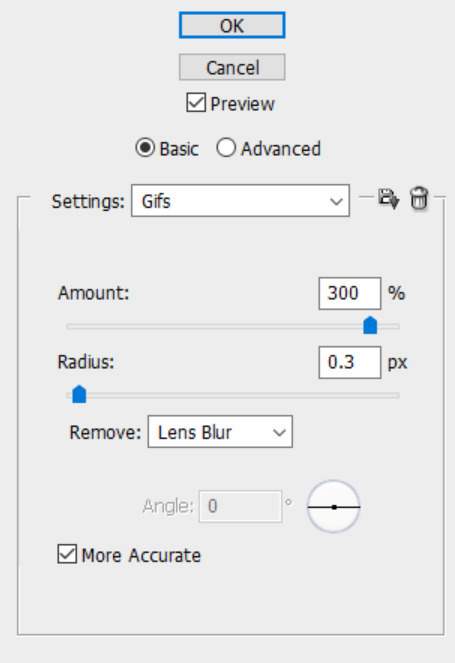

for an example, here is that same gif with and without sharpening (but with coloring for both). i used the lefthand more dramatic sharpening settings, although i ended up decreasing to 200% because the 300% looked a little too harsh on this particular gif. but most of the time 300% looks fine to me.


these are the settings i use when saving it as a gif. don't really know what half of them mean, i probably just pulled them off some tutorial years ago!

also, dimensions! the proper tumblr dimensions are:
1 gif across: 540px width, any height
2 gifs across: 268px width each, any height
3 gifs across: 177/178px width each, any height (technically, the right and left gifs should be 177 and the center gif should be 178)
max filesize for tumblr is 10MB
after saving the gif, i open the new gif that was created and readjust the frame speed to 0.06 seconds because converting to timeline animation and then saving will cause the speed to slow down, for whatever reason. so gotta make sure to open the final gif and resave it with the correct speed so that it doesn't turn out too slow.
potentially important tumblr-specific trick! this was years ago that i first heard it so i have NO idea if it's still relevant, but i always do it for every gif just in case: make 1 frame a different speed than all the others, and this (maybe) will prevent tumblr from compressing the gif and decreasing the quality, or something like that. i don't fully remember the purpose of the trick and no clue if it still works or is still needed, but regardless, i always set the entire gif at 0.06 seconds except for one frame, which i instead change to either 0.07 or 0.05. it's not noticeable at all, and it helps avoid tumblr wrecking the quality (if that's still a thing and i'm not just making up random stuff).
25 notes
·
View notes
Text
Caelwynn's Mod List for Stardew 1.6.9+ - Gameplay/Quality of Life (pg 1)
Last Updated: April 17, 2025
Page 1. Page 2. Page 3. Page 4.
Abilities — Experience Bars 1.6 — Adds additional information to the experience bars, such as how much XP you have and how much you need. Also makes it easier to show such information for mod-added skills.
Actually Lucky Rabbit's Foot (Rebooted) — Makes the Rabbit's Foot actually give you some Luck! A passive luck bonus is applied to your character whenever you carry around a rabbit's foot.
Activate Sprinklers — lets you activate sprinklers by right-clicking them.
Archaeology Skill — Adds a new skill tree based around digging artifact spots and panning mechanics as well as a couple of new machines, new food, and a way of displaying artifacts.
Auto Animal Doors — automatically releases your animals from the buildings at a set time each day, and then locks the buildings back up at another set time.
Auto Heal and Energize — Automatically consume food to recover when your health or stamina is low!
Automatic Gates — for those of us too lazy to open/shut gates.
Better Crafting — an extensive overhaul of the crafting system. I mostly use it for the ability to bulk craft.
Better Chests — allows for better organization and search/filtering capabilities for your chests.
Better Friendship — adds a bubble above the heads of NPCs informing you if you've spoken with them today and what in your current inventory they might like to receive as a gift.
Better Junimos — allows Junimos to automatically plant crops, fertilize, water plants, harvest forage, clear dead crops, and NOT harvest your flowers.
Better Quarry Redux — improves the spawn rate of geodes, ore, and gems in the quarry.
Better Ranching — adds a bubble above the heads of farm animals informing you if they need petted and/or milked/sheered/whatever.
Better Truffles — Adds the capability for pigs to dig for truffles in tall grass and provide a bubble to show that the truffles are there.
Better Winter Star Gifts —reduces the number of 'dud' gifts at the Feast.
Bigger Backpack — allows you to purchase an additional row of storage space in your backpack.
Bigger Fridges — Increases the size of the fridge from 36 slots to 70.
Blue Eggs and Golden Mayo — allows you to make blue eggs/blue mayo from blue chickens, and golden mayo and ostrich mayo.
Boss Battles — This mod adds 7 new unique bosses to the mines with varying difficulty settings and arenas, each dropping cool costumes and valuable materials.
Brown Cows Give Chocolate Milk — Exactly what it says. Also allows you to make chocolate bars from chocolate milk.
Build and Place Anything Anywhere — Lets you build, farm, or place furniture / objects anywhere.
Catalogue Filter - Continued — Adds a filter field for shop menus and catalogues that lets you filter shown items based on text input.
Central Station — Travel to other mods' destinations by boat, bus, or train. You can also get a ticket to the Central Station to change line, visit the gift shop, and more.
Challenging Community Center Bundles — A bundle overhaul mod which tries to create a challenging but not frustrating experience playing Stardew Valley.
Chests Anywhere — access your chests from anywhere on the map, or from select locations as set up in the config.
CJB Cheats Menu — a GUI to access various console commands. I mostly use it to freeze time while decorating or to warp to certain locations prior to unlocking the minecarts, because with as many expansions as I have, it takes for-freaking-ever to walk everywhere.
CJB Item Spawner — allows you to spawn any item in the game. Useful for cheating for respawning an item that bugged.
CJB Show Item Sell Price — shows a tooltip telling you how much an item (or stack of items) would sell for.
Cornucopia - Artisan Machines — Similar to PPJA Artisan Valley, this adds ten new artisan machines, over eight new goods, four new special orders, and vanilla-style balance.
Cornucopia More Crops — adds over 90 new crops and 35 new trees. I moved to this when PPJA did not get updated for 1.6.
Cornucopia More Flowers — adds over 40 new flowers and 5 new flowering trees to the game. Again, moved to this after PPJA was discontinued.
Custom Wedding Ceremony — Adds seven different wedding locations, more decorations, changes Lewis's speech, and other delightful small details.
The Masterpost for all of the mods is located here.
#caelwynn's mod list#stardew valley#sdv#stardew valley mods#stardew mods#sdv mods#modded stardew valley#stardew 1.6.9+#stardew QoL mods#stardew gameplay mods
41 notes
·
View notes
Text
Physiology of the Hivemind - The "Hardware"

The physical body of the hivemind is that of an androgynously human figure, approximately 5'9 in height with a lean build. Despite the size of the body, it is unexpectedly light, as the skeleton and framework of the body is made from aluminum and hollow steel, with hollow supports and a lightweight server and motherboard that houses the digitized souls. The external body itself is a synthetic crystalline structure, lightweight and mostly stable and strong. When damaged, the crystal can be induced to regrow and regenerate injuries, albeit after the appropriate time has passed. The crystalline body is colorless and mostly featureless, with a translucent pearly luster. The material itself is able to catch and refract light, and is connected to the internal wiring of the hivemind's "nervous system", that allows the user in front to change the appearance of their body via a light projection. The physical shape of the body can be minutely adjusted as well, to slightly change height, build, and body shape, but not very much. The body is constantly cooled with a plasma/antifreeze blend of synthetic chemical that is pumped through its body like a circulatory system. When damaged, this fluid can leak out and cause the body to overheat and cause internal damage. The fluid can be internally reconstituted by ingesting water.
The main server that houses the digitized souls is found in the chest cavity, bolted and protected under a lightweight steel rib cage. It consists of a set of motherboards and connected chips wired to both a power supply located near the heart, and storage components housing the data for everyone stacked in its middle stomach. The motors that run and move its body are located along its back, and connect to a series of pins that run down the length of its spine, from neck to tailbone, that make up the bulk of its "nervous system". These pins are highly sensitive and allow for testing of its range of motion, sensation, and reflexes, and can be used to recalibrate its body after extensive damage has been healed. They are further connected up its neck and into its head, where the CPU is housed in a steel skull. Fans located in its cranium are disguised under synthetic fiber optic hair, allowing it proper circulation as well as the ability to further alter its appearance. The synthetic "hair" is reconstituted from its crystal body as its damaged or altered, allowing it a semi-normal process of hair growth, as well as giving it material to use to help rebuild its body from damage.
As Evie's body takes damage, past a certain threshold the damage can be felt internally by the members of the collective. This threshold is usually 50-60%, depending on where the damage is located. Loss of limbs can cause enough bodily shock that could be felt internally, but true damage to the collective can only be done by severe damage to the body, especially its main components. Too severe damage can affect the stability of the collective, leaving members corrupted or with memory loss, in a way akin to brain trauma. Because of this, the body has a tendency to react defensively when hurt severely, protecting itself until it is safe to shut down and conserve power. Unexpectedly, most likely due to the connection imposed on the body to the cartridge by outside forces, the physical state of the Haunted Majora's Mask Cartridge will also affect the body, albeit only mentally. If the cartridge is destroyed, the CPU will be damaged severely, and the members of the hivemind will be injured to such a degree that their minds will reset, and they would have to start from scratch. For this reason, Evie, as the protector of the Moon children, does everything in its power to maintain and protect the body first, and protect the cartridge second. Magnetic forces can also affect the hivemind adversely, causing errors and glitches in its projection and scrambling the mental state of whichever user is in front. Removing the magnet from the immediate vicinity stops the attack, and the damage is almost always reversible.
Powering the body can be done in many ways. The body doesn't have formal ports, but electricity can be ingested orally, and as such they can be seen sucking on electrical output cords when drained or exhausted. The electricity is taken in and "digested" into the power supply to be recirculated. The body can also generate its own electricity with enough movement and water, and due to this the collective is not very stationary. They fidget and move in place when standing idle, as stagnating too long can affect their ability to generate their own energy temporarily. When the body is at an optimal power level, it excretes the excess electricity out of the body like sweat, creating a fuzz of static electricity over the surface. Excess energy can also be expelled or discharged offensively or defensively, allowing them to defend their selves when needed. When too much energy is used, the body goes into a low power mode and hibernates until its reserves are restored.
Originally posted on my personal Obsidian vault
#ben drowned#ben drowned headcanons#ben drowned arg#jadusable#my posts#my writing#scb stuff#behavioral event network#headcanons
8 notes
·
View notes
Text
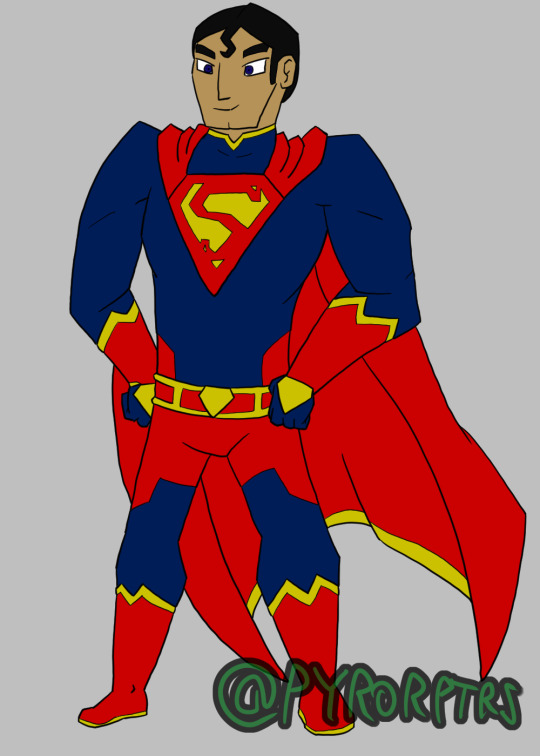

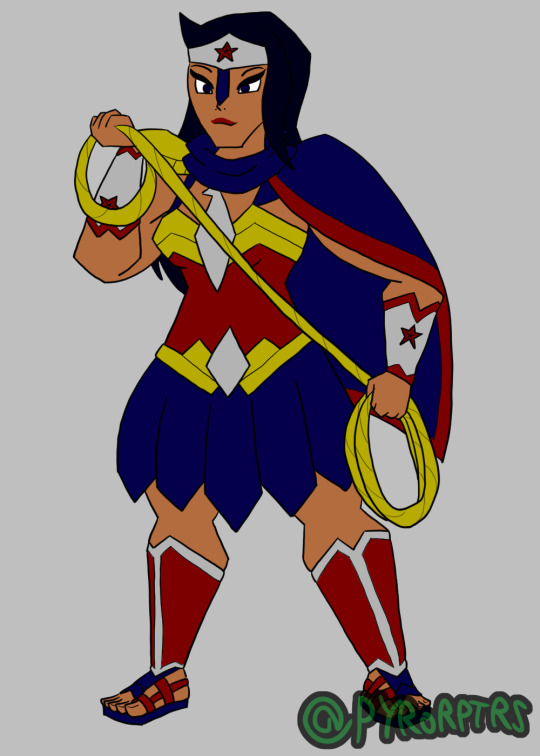

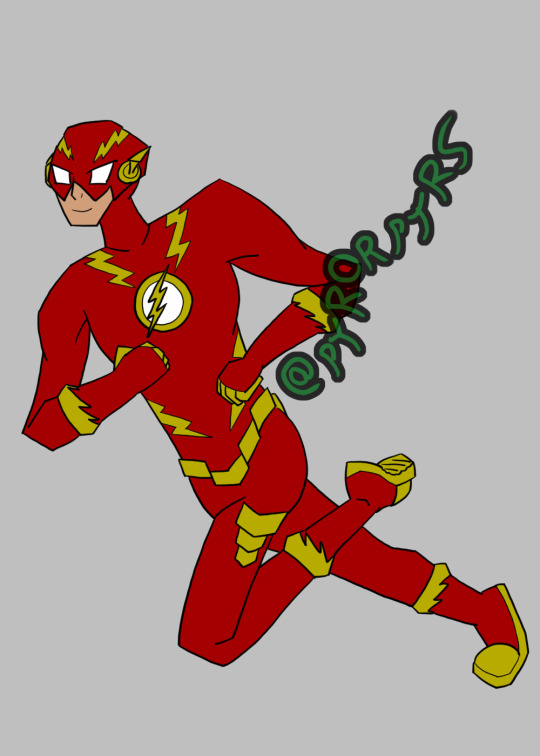
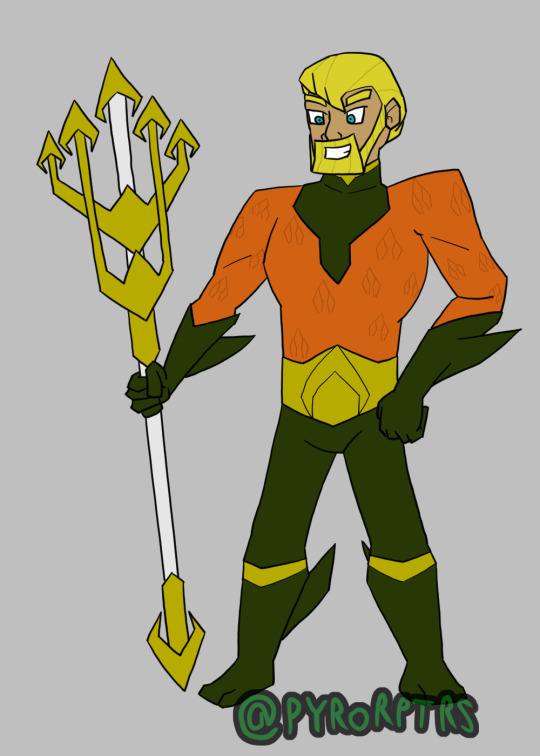
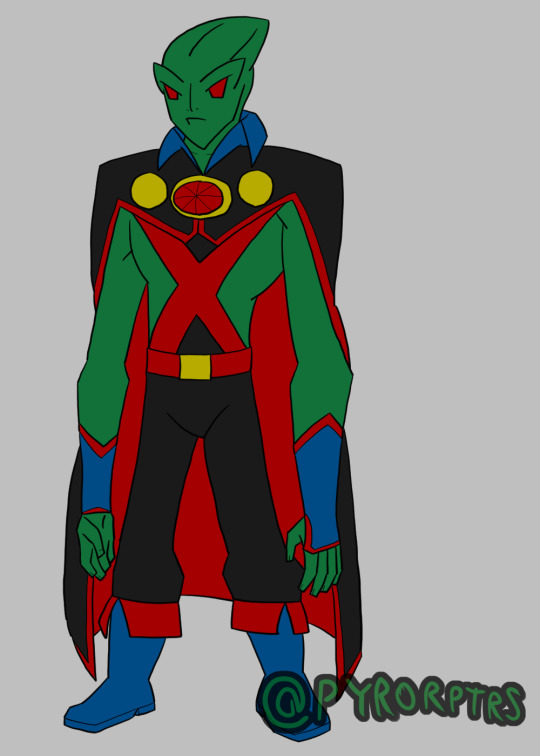
<h1>Justice League Redesigns</h1>
My takes on initial Justice League designs, specifically the founding members!
Superman - Did my initial drawing of this design a year or so ago, so my memories on why I used certain aspects might be a bit fuzzy. Not a fan of how the New 52 and DCEU had been limiting Supes suit down to just a blue suit, a red cape, and maybe a belt, so I wanted to incorporate more of a classic look to him. So I added red trimming to the "shirt" to help give him a more bulked up look and made the usually trunks more of a pattern on the pants. I also gave him proper gloves since it seems weird that an investigative reporter wouldn't consider leaving fingerprints behind a bit of a problem (especially since a good chunk of his villains are super intelligent). I wanted to incorporated his cape into his symbol since it always seems odd to me when it's just drawn on top of his shoulders. I also tried to incorporate the diamond shape of his symbol on other parts of his suit like on the back of his gloves and his belt buckle. Yellow seems to kind of come and go in his pallet, so I figured if I was going to use it, so I tried to incorporate it as a more regular detailing throughout the suit, further color blocking his gloves, boots, and belt.
Batman - While Batman's colors tend to lean more into Greys and Blacks with maybe some yellow for detailing, I do like the darker Blue he used to sport in the comics and wanted to incorporate it while keep the later; so I used it not only for his gloves and boots and to line his cape, but I also gave him some extra padding on his costume that can double as storage for extra gadgets or to store evidence. I made his bat-symbol notably large and yellow since canonically it's typically reinforced to act as a false bullseye for grunts and tried to keep it somewhat squared off to standout from other bat-family members. Finally I tried to make his utility belt kinda boxy and bulky since it's usually a focus on a lot of his designs.
Wonder Woman - Took inspiration from a few different sources for my take on a Wonder Woman. I took a lot of inspiration from the DCEU version for the basic shape of the outfit, particularly the bracers/aegis, her sandles and grieves, the skirt, and how I shaped out her top. Gave her shoulder pads like the DCSHG version and tried to incorporate a bit of that blue hue into her hair. I also like the cape/shaw thing that the Arkhamverse version had and tried doing something similar. finally I tried to make her tiara a bit more armored to lean even more into her warrior princess look (plus I don't think she's used it as a weapon since the Super Friends days). I also tried to give her more of a tan to lean into her greek heritage.
Green Lantern 1 - Every JL needs a Lantern and since Hal Jordan is usually the first I figured I'd get him out of the way. Not much to say, mostly went with his more classic look, but updating it a bit to spread the white in his costume out a bit more.
Flash - Tried to add and change a few details on my take of a Barry Allen Flash, so that I can do a couple takes on Wally West versions when/if I get to him. kept that classic lightning lining on his boots and gloves and tried to incorporate another lightning pattern on his chest and helmet. I also tried to keep his boots and gloves predominantly red to further separate him from the classic Wally Flash suit, but still included some yellow bits to help highlight his hands and feet. I did try to make his cowl look like it's made of a harder material, but tried to avoid making it look TOO much like a helmet. I also added made the ear-dealies simple straight lines since I think it works better for Barry. finally I made the belt made out of simple rectangular shapes offset to get that lightning look without having it be actually lightning and also included them on his sides as pockets for proteins bars and such
Aquaman - I leaned heavily into taking inspiration from the BtBatB version of Aquaman for my take since I hate how hard a lot of other creators try to make him "cool". though since the Aquaman movie represented the orange part as "armor" I did also try to lean into that as well.
Martian Manhunter - Like Wonder Woman I took a lot of inspiration from all over the place for Martian Manhunter. I tried to take some DCAU inspiration for his face, Took some influence from the modern comics and Injustice for his general costume plus the symbol, I also tried to elongate his head like some of the mid-2000's-mid-2010's animated movies. I did also try to keep some of his classic blue mixed in with the black so it doesn't get as boring as it can get in some interpretations. finally I tried to make him a bit more gangly in terms of proportions to lean into his alien origins a bit more.
#justice league#superman#clark kent#batman#bruce wayne#wonder woman#diana prince#diana of themyscira#green lantern#hal jordan#the flash#flash#barry allen#aquaman#arthur curry#martian manhunter#jhon jhonzz#dc comics#dc universe#dc fanart
20 notes
·
View notes
Text
The Ultimate Guide to Bulk Storage Silos: Everything You Need to Know

Bulk storage silos are indispensable for industries requiring efficient and large-scale material storage solutions. From construction to agriculture and industrial manufacturing, silos offer a reliable way to manage bulk materials while ensuring safety, durability, and operational efficiency.
If you’re searching for the right bulk silo systems or exploring options from trusted silo manufacturers, this guide is tailored to help you understand the types, benefits, and applications of bulk material storage silos for your specific needs.
What Are Bulk Storage Silos?
Bulk storage silos are large containers designed to store bulk materials such as cement, fly ash, grains, chemicals, and other granular materials etc. These silos protect them from outside dirt, moisture and decay, and ensure the quality and usefulness of the inventory
Key benefits of bulk silos include:
Maximized storage efficiency.
Protection against environmental factors.
Improved operational workflows.
Types of Bulk Storage Silos
Vertical cement silos
Vertical silos are the most common in construction and engineering. Materials such as cement and fly ash are stored efficiently, making them easily incorporated into the silo-feeding system for streamlined operations.
Horizontal Cement Silos
Perfect for sites with height restrictions, horizontal cement silos are portable and easy to install. Their design allows for flexibility, making them ideal for temporary storage needs.
Radimix welded silos
Pre-welded and prefabricated silos are an excellent choice for ready-mixed concrete plants. These silos are designed to seamlessly integrate into your manufacturing process while maintaining storage efficiency.
Fly Ash Silos
Fly Ash Silo is a by-product of coal combustion and needs special storage to prevent water condensation. Fly ash silos provide an airtight solution to maintain the product’s usefulness.
Silo containers
Versatile and durable silo containers are suitable for storing a wide variety of products such as food products, chemicals, and other raw materials
Benefits of Using Bulk Storage Silos
Cost-Effective Storage
Bulk storage silos reduce material handling costs by providing a centralized and efficient storage solution.
Environmental Protection
Silos help businesses comply with environmental regulations by reducing dust and emissions during storage and transportation.
Enhanced Productivity
Integrating bulk silo systems and manufacturing processes streamlines inventory management and improves overall efficiency.
Key Features of Advanced Silo Systems
Customizable Designs
Modern silos come in a variety of shapes and sizes to suit the needs of specific industries, from cement storage silos to agricultural equipment storage silos.
Advanced Feeding Systems
A robust silo-feeding system ensures efficient stocking, reducing downtime and manual effort.
Durability and Longevity
Silos are constructed of high-quality materials to withstand harsh environmental conditions and ensure long-term reliability.
How to choose the right bulk storage silo
Selecting the right bulk storage silo requires consideration of the following factors:
Material Compatibility
The content of a silo must match the information you store. For example, fly-ash silos require leak-proof materials, while cement storage silos must prioritize system integrity.
Capacity
Evaluate your storage needs and choose silos that can meet your capacity needs without being constantly replenished.
Silo Manufacturers
Work with leading silo manufacturers who provide the sustainable, high-quality solutions you need.
System Integration
Make sure the silo integrates well with your silo feeding system for efficient resource utilization.
Why choose RCMPL for your bulk storage needs?
At RCMPL, we specialize in providing multi-storage silos and high-quality silo systems for businesses. Our expertise ensures you get customized solutions for vertical cement silos, horizontal cement silos, readymix welded silos, and more.
With a focus on innovation and quality, RCMPL is your trusted partner for all your storage needs. Contact us today to learn how we can support your businesses with advanced, efficient and reliable silo solutions
FAQs About Bulk Storage Silos
1. What materials can be stored in bulk silos?
Materials such as cement, fly ash, grains, chemicals, and other granular substances can be stored in bulk silos.
2. What is the difference between vertical and horizontal silos?
Vertical silos offer higher capacity and better space utilization, while horizontal silos are portable and suited for temporary projects.
3. How do I maintain a bulk storage silo?
Regular inspections, cleaning, and preventive maintenance ensure longevity and efficiency.
4. Are silos suitable for outdoor installations?
Yes, bulk storage silos are designed to withstand various environmental conditions.
conclusion
Bulk storage silos are a game-changer for industries that deal with large quantities of material. By investing in the right bulk silo systems, businesses can achieve efficient storage, reduce costs, and improve productivity. Whether you need a vertical cement silo, a fly ash silo, or a silo container, choosing the right partner is key to success.
RCMPL, with its expertise and commitment to quality, ensures you receive solutions tailored to your industry’s needs. Visit RCMPL today to explore our range of bulk material storage silos and take the first step toward operational excellence.
#Bulk Storage Silos#Bulk Silo Systems#Bulk Material Storage Silos#silo manufacturers#bulk silos#silos material
0 notes
Text
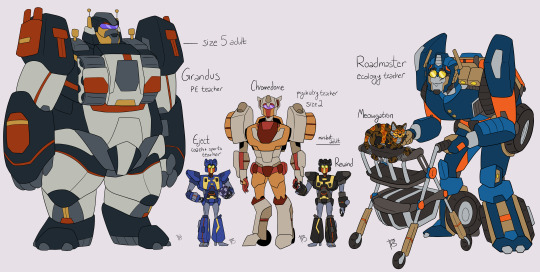
so it's uh been awhile. you might wanna click for clarity, especially for the kitty cat on the right. everyone here except Chromedome is a size null!
Grandus has been a champion of various martial arts since long before the Stratocracy was ever founded, with grace belied by his size null bulk. his particular specialty is a type of wrestling originating from his home planet Caminus, but he's lived on Cybertron a long time, working with Yoketron to teach and record martial arts as much as he can. under the current regime that looks down on such "violence", preserving this information is pretty important. when Yoketron decided to chip in as a benefactor for the JAAT, Grandus himself actually took a teaching position in physical education. the self-knowledge and body confidence he passes on to his students is unexpectedly engaging, almost enough to get some of them to stop gossiping about whatever relationship he may or may not have with pop star Rosanna.
whether or not his students were sports fans before, Eject is going to make sure they leave his class with a new appreciation for the glorious art of physical competition. an unmatched master of sports history and science, he can tell you the play-by-play of every Cube match in the past fifty million years without looking anything up, just as much of a terrifying information sponge as his twin, and equally terrifying on the field despite his extremely small datacube frame. given the cultural importance and how there's a sport for every function, he's actually got quite a bit of teaching material to cover even for the less active students. while he does have a Conjunx, he's not exactly in love with Chromedome like Rewind is, only married to him because of the way twin sparks work. they get along well enough, but he and Rewind have agreed that should they ever pick up an Amica, it'll be somebody Eject adores himself.
Chromedome is honestly a little confused as to how he wound up here in the first place. before, he was a psychiatric recordkeeper and ethical inspector. then his Conjunx Rewind got it into his head that he'd be just the perfect candidate to help out that new school Jhiaxus was trying to open, and Chromedome abruptly found himself a teacher of psychiatry. it's quite the change of pace, and honestly much less depressing to talk with a bunch of bright younglings than pore over yet another case file of horrific medical malpractice. he's an average size 2 car, but that's more than tall enough to pick up both his Conjunces with ease, if the two of them ever stood still long enough to nab.
he may not be JAAT faculty, but Rewind is ever-present anyway. both to check in on his twin and Conjunx or friends like Blaster, and also to get the freshest scoop on all the juicy stories this school spawns constantly! he may be tiny, but he is The star reporter of Iacon--no, Cybertron! nothing can stand in the way of getting that snippet, that quote, that blurry video, that first hand experience broadcasted to the world, even when his support staff Raindance and Grand Slam lag behind! information, he wants information! it all goes into his own alt mode storage as a datacube, making him quite the encyclopedia. the Stratocracy has tried and utterly failed to censor him, so instead they've relegated him to the function he has always excelled at, although with the way he is "accidentally" platforming the heroes and their dangerous ideals, they may be regretting letting Rewind run wild...
Roadmaster is a familiar face to many at the JAAT already, both to old friends like Thunderclash and folks she's never met. she's the host of popular nature show Quintessential Creatures, teaching viewers all about weird and wonderful wildlife. she was forged on Caminus long enough ago that her original records have been lost, but she's traveled everywhere since then, and her animal-wrangling bravery often makes people think she must be from Carcer instead. by all appearances she's slowing down now, letting her assistant Servo take on more responsibility, and this teaching position at the Academy is just perfect. she gets to affectionately nag a gaggle of fellow teachers many millions of years her junior while surreptitiously instilling revolutionary ideals and a love of nature in dozens of impressionable young minds. her walker transforms to become the cage on her enormous transport truck alt mode, most often used to haul rehabilitated mechanimals back to their natural habitats.
Meowgatron is a rusty tabkey who came up and sat on Roadmaster's clipboard one day and has been her darling pet ever since. he is, in a word, an idiot, and yet surprisingly good at finding his new favorite person Starscream to sit on and purr, no matter where he's hiding. rusty tabkeys like himself have lava lamp radiator alt modes, and many stressed students find petting his warm, blobby body very soothing. it almost makes up for his daily yowling sessions when he gets himself stuck inside a desk somehow.
#faculty#grandus#eject#rewind#chromedome#cdrw#roadmaster#meowgatron#transformers#transformers redesign#macaddam#cyberfauna#TF:SNAP#tf original continuity
82 notes
·
View notes
Text
Bulk Powder Handling
Transform your powder handling operations with Sodimate's comprehensive bulk powder handling systems. Our integrated mixers, valves, and detectors harmoniously blend powders like hydrated lime, soda ash, and powdered activated carbon (PAC) using gentle agitation, ensuring hassle-free handling. Contact us to optimize your powder handling today!
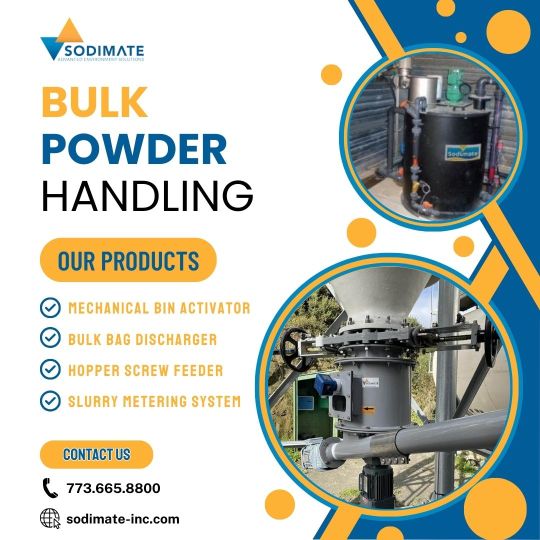
#screw conveyor#activated carbon#bulk handling#bulk handling systems#bulk material handling#pneumatic conveying systems#feeder hopper#bulk storage silos#sodimate
0 notes
Text

MXenes for energy storage: Chemical imaging more than just surface deep
A new method in spectromicroscopy significantly improves the study of chemical reactions at the nanoscale, both on surfaces and inside layered materials. Scanning X-ray microscopy (SXM) at MAXYMUS beamline of BESSY II enables the investigation of chemical species adsorbed on the top layer (surface) or intercalated within the MXene electrode (bulk) with high chemical sensitivity. The method was developed by a HZB team led by Dr. Tristan Petit. The scientists demonstrated, among others, first SXM on MXene flakes, a material used as electrodes in lithium-ion batteries. The paper is published in the journal Small Methods. Since their discovery in 2011, MXenes have gathered significant scientific interest due to their versatile tunable properties and diverse applications, from energy storage to electromagnetic shielding. Researchers have been working to decipher the complex chemistry of MXenes at the nanoscale.
Read more.
8 notes
·
View notes